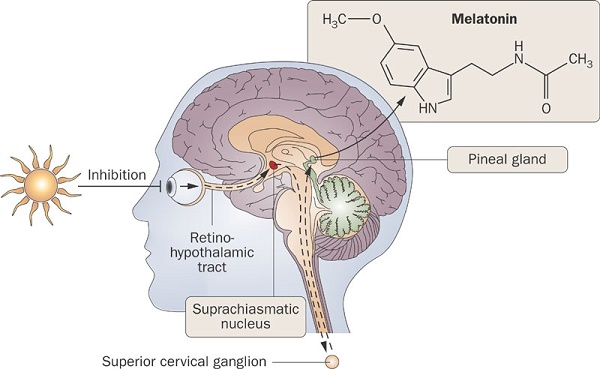If you’re always feeling tired and groggy, a hormonal imbalance may be to blame.
Our endocrine system helps to regulate our hormones, which are extremely sensitive to changes in our sleep patterns.
On the other hand, our hormones help to control our energy, metabolism, and moods – which influence our sleep quality.
The bottom line? Our hormones and sleep patterns are linked. Imbalanced hormones lead to imbalanced sleep, while sleep deprivation further throws hormones out of wack.
So how do you break the vicious, sleepless cycle?
Imbalanced Hormones = Imbalanced Sleep
Hormones send messages to our body, providing instructions about what to do with our energy levels, metabolism, growth, mental state, and more.
Hormonal imbalances occur when the body produces too much or too little of one or more different hormones.
While some hormonal imbalances are temporary, others are long-term conditions that require treatment to correct the major changes they cause to your body and energy levels.

Our bodies make more than 50 different hormones. Therefore, your specific symptoms may vary depending on which hormonal imbalance(s) you have.
What’s more, your healthcare provider must order a blood test to check your hormone levels. This is because our endocrine system releases hormones directly into the bloodstream.
Our endocrine system includes the hypothalamus, pituitary gland, thyroid gland, thymus, adrenal glands, pancreas, and pineal gland.
Endocrine glands regulate how much of each hormone is released into our blood.
Inside The Endocrine System
The endocrine system is the motherboard of our hormones, reproductive system, and energy levels, so to speak.
Within the endocrine system, the hypothalamus helps to manage our body temperature, hunger and thirst cues, blood pressure, sleep patterns, and more.
The pituitary gland, sometimes referred to as the “master” of the endocrine system, helps to manage growth and metabolism along with the function of many other endocrine glands.
Our thyroid gland helps to regulate metabolism, while parathyroid glands manage calcium levels.
Our thymus, a small organ within our upper chest, creates white blood cells that help to guard our immune system against infection.
Adrenal glands are small glands that sit on top of both of our kidneys. They produce hormones connected to metabolism, immunity, blood pressure, and stress responses.
In fact, issues with our adrenal glands and anxiety are surprisingly closely connected.
The adrenal glands release adrenaline when we experience anxiety, which prepares the body to react to danger by either fighting or fleeing from a threat.
From an evolutionary standpoint, this helped us fight or run from danger in ancient times. In the modern day, however, most perceived threats aren’t actually life-threatening.
This leads to fatigue of the adrenal glands, anxiety, and worsened hormonal imbalances across the board.
The pancreas manages two main functions: digestion and blood sugar control.
Finally, the smallest endocrine gland, known as the pineal gland, receives information from the amount of light within our environment to control the production and secretion of the sleep hormone melatonin.
Don’t “Sleep” On the Pineal Gland, the Smallest Endocrine Gland
A healthy pineal gland is the size of a grain of rice, making this pine-cone-shaped gland the smallest endocrine gland in the body.
Our pineal gland is one of the least understood glands within the endocrine system, as it was the most recent part to be discovered, according to the Cleveland Clinic.
From what we do know about the pineal gland, its main function is to receive and interpret information about the light-dark cycle from our field of vision to either produce more or less melatonin.
In the absence of light, this gland secretes more melatonin, causing us to feel tired and ready for bed. In bright light, the pineal gland holds off on melatonin secretion, leading to alertness.
If we’re exposed to too much blue light emitted by our electronics at night, this rise in melatonin by the pineal gland never occurs.
As a result, poor sleep follows. When we experience poor sleep, we only further disrupt the balance of other hormones.
After just one night of sleep, ghrelin, a hunger hormone, rises. Insulin, a key player in fat storage, also increases. The stress hormone cortisol follows.
As those hormones rise, levels of leptin, which regulates appetite, and Human Growth Hormone (HGH) known to help rebuild and grow muscle, both dip.
Therefore, poor sleep may lead to increased stress, higher hunger levels, insulin resistance, increased risk of fat storage, and decreased muscle mass.
It’s no surprise, then, that sleep disorders and endocrine disorders are well-documented as concurrent conditions.
In fact, circadian disruption caused by shift work is proven to cause severe metabolic syndrome, which only further disrupts sleep patterns.
So how do you break the cycle? By balancing both your hormones and sleep patterns.
Balance Fatigue by Balancing Hormones
Only a doctor can determine if your hormones are imbalanced with a blood test. That said, by managing stress and improving sleep patterns with lifestyle changes, hormonal imbalances may improve.
Find yourself scrolling or watching television late into the night? This habit may be confusing your pineal gland.
By avoiding too much artificial light at night, you will keep your pineal gland functioning like a well-oiled machine, helping you to actually feel tired past nightfall.
If you must use electronics at night, use blue light-blocking glasses, which limit the amount of blue light that reaches your eyes.
While evening light exposure is harmful to sleep patterns, morning light exposure helps to set our internal clock for the day, signaling to the pineal gland to release melatonin later on.
@somnifix Timing of exercise, food intake, and sunlight exposure help to set our internal clock ☀️🏋️🥙 #hubermanlab #andrewhuberman #nueroscience #biohack #learntok #sleepscience ♬ Sarah - Alex G
Diet changes, like avoiding overeating, limiting sugar intake, and eating healthful fats may also help improve sleep patterns.
What’s more, you should cut out caffeine and alcohol before bed and avoid smoking, as all are known to lead to restless sleep.
However, if you’re snoring into the night, your sleep quality is getting cut short.
Put Snoring to Bed
When we snore, we place the body in a stressed, fight-or-flight state. This overwhelms the endocrine system and adrenal glands. Anxiety and poor sleep follow.
The main cause of snoring? Mouth breathing during sleep. When we mouth breathe, airway tissues collapse and vibrate together, producing the sound of sawing logs.
This disrupts your sleep, your partner’s sleep, and if left untreated, may even lead to sleep apnea.
Nasal breathing, however, prevents open-mouth snoring and produces nitric oxide, a vasodilator that helps to activate the parasympathetic nervous system responsible for our rest and digest response.
As a result, you’ll sleep more soundly and experience a state of calm upon waking. So how do you make sure you’re nasal breathing if you’re asleep?
Tape your mouth shut before bed. It’s no joke – taping the lips makes mouth breathing impossible, meaning open-mouth snoring becomes impossible, too.

Before you grab the first tape you can find, you should know that most tapes aren’t skin safe. The adhesives in most tapes contain chemicals known to cause skin irritation.
Rashes aren’t a good look.
SomniFix, however, was created exclusively for the sensitive skin around the mouth. Our tape is free of both latex and gluten.
It’s hypoallergenic and even features a patented central breathing vent to help you get used to the sensation of mouth taping overnight.
As you balance your hormones and sleep routine, work to balance your overnight breathing patterns with SomniFix!





